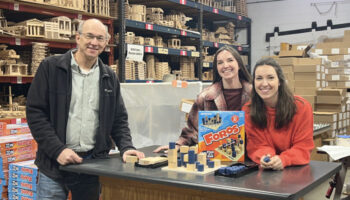Inventor Peggy Brown on Adulting, Awk-Word and the elegance of simplicity

Hi Peggy, always lovely to tie-in. You’ve recently had two fun-looking games launch with the folks at Ridley’s. Let’s dive into them! Adulting – a game where you have to act out various staples of ‘grown up’ life to earn badges and ultimately emerge triumphant. It’s a simple, trendy idea – where did this idea come from?
We hear the term ‘Adulting’ more and more, and it just seemed so silly and dumb that we absolutely had to apply it to something. I’d have to say the game came out of lockdown because over the course to the last three years, ridiculously minor and mundane life tasks seem practically heroic, even for grown-ups. This common relatable truth begged for a way to present tongue-in-cheek awards for these miniscule triumphs during chaotic times. When we paired goofy scout-like merit badges with the name, it melded perfectly.

‘Mastered Parallel Parking’, ‘Remembered to Stay Hydrated’, ‘Sorted Out My Inbox’. Was there a bit of a knack to writing things that feel very ‘grown up’ and that are also interested to act out?
Yes and no… The game pretty much wrote itself. All we did was think of routine stuff people accomplish every day for which nobody actually deserves any recognition whatsoever. It’s so pathetic that it’s funny.
Lots of inventors we speak with say that remaining in touch with their inner child proves helpful when creating toys and game. With that in mind, do you find ‘adulting’ gets in the way of your creative process at all?
Nope. My inner child has very high self-esteem! Hahaha! Really. No worries in that department – perhaps the opposite!

Let’s move onto Awk-Word; great name! This is one of those games that sounds simple – quickly shout out words relating to a topic… But the wrinkle is that you have to roll dice, and you can’t name something beginning with one of the letters shown on the dice… Meaning I’ll inevitably only think of words beginning with those letters! Brilliantly infuriating! How did this one come about?
This game wasn’t originally named Awk-Word – it was named a variety of terms for keeping quiet. Sometimes simple is best, and this game is so classically simple that it just plain works – with hardly any rules, with simple components, with few or many players, in any setting, for as short or as long as you want to play. It’s the kind of game many companies overlook because it seems vanilla or too familiar, but I think that’s the charm of it. It’s easy-peasy and just plain fun.
On that, how do you strike the balance between creating game concepts that both feels familiar but also contains the right amount of ‘newness’? I’d imagine falling too far either side has its risks, so it must be a bit of a tightrope walk?
It’s tricky. Mostly it’s tricky licensing it. Companies want new and different and comfy and familiar all at the same time. I don’t think consumers are as picky as game companies are! But they all need to find unexplored territory that isn’t too scary, so yeah – tightrope walking is a great analogy. It can feel impossible sometimes, but that’s where the elegance of simplicity can save the day.

On names, where does creating titles for your games pop up in the process? Do your ideas sometimes start with a name?
I don’t know. Sometimes we riff on a theme and the name becomes obvious, sometimes a play pattern morphs a few times before its name reveals itself, and sometimes we submit a game with a great name and that name gets replaced. There is no method to it. I love word play, so funny and punny names are just one more part of a game that we need to create.
What made Ridley’s a good home for these titles? What are they like to work with?
Ridley’s makes solidly fun, cleverly simple games. They are not about long rules, stipulations or endless details – they make games with good humour that are easy-going and light-hearted, often based on comedic, nostalgic, or broadly popular themes. They never get out in the weeds, yet their products are always fresh. That seems like it ought to be easy, but it’s quite the opposite. Games can get so very complicated, and making them complex is actually kind of easy – you just add more and more rules. Distilling them down to their essence is the hard part.
Absolutely. Peggy, this has been great. I have one last question! What would you say is your most underrated game? We can give it some love and attention here!
I never answer these kinds of questions – what’s your favourite, what’s your worst, what’s your most surprising game? I seriously don’t know. It’s like when you see a neon sign in a diner window that says “World’s Best Coffee.” There are waaay too many metrics to make a scientific judgement and lay that claim, but sure, I’ll have a coffee. Maybe that question can be better answered long after I’m gone, but it’s most likely at this moment in time, my most underrated game is still sitting on the shelf in the prototype room, patiently waiting for its 15 minutes of fame.
Always great to chat Peggy. Thanks again.
–
To stay in the loop with the latest news, interviews and features from the world of toy and game design, sign up to our weekly newsletter here
























